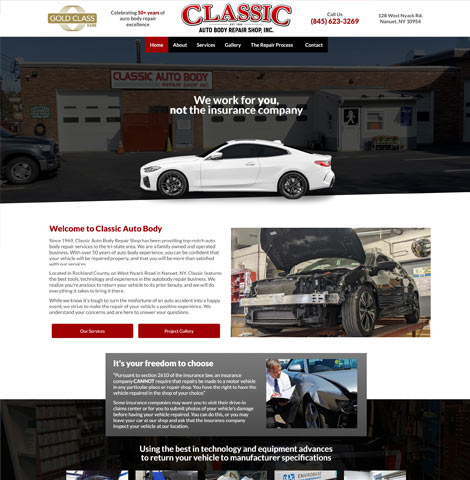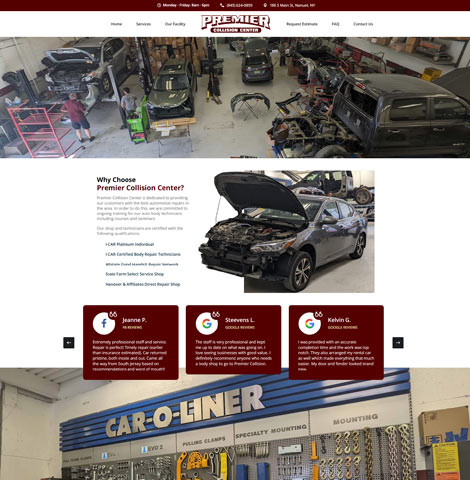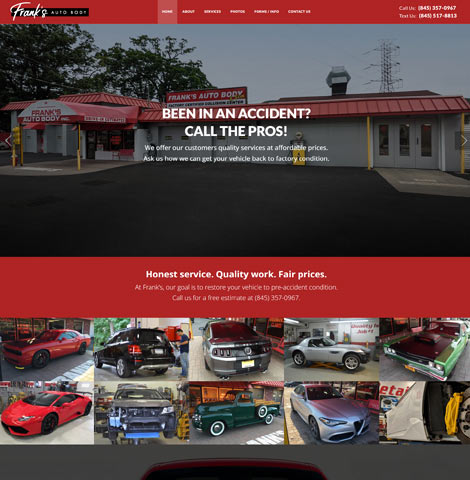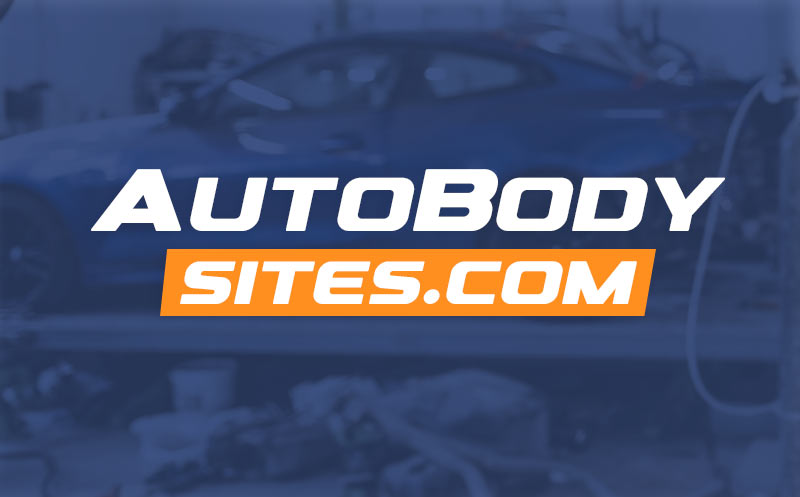In today’s competitive market, auto body shops must have a website that not only looks good but also converts visitors into customers. Many shop owners wonder whether they should build their website themselves (DIY) or hire a professional web designer. Here’s a breakdown of the pros and cons to help you decide.
DIY Website: Pros and Cons
Pros:
- Lower upfront cost
For many small or newly established shops, the idea of building a site without hiring help can seem attractive simply because it appears budget-friendly. Using platforms like Wix or Squarespace, it’s possible to get a website online for a relatively small cost, sometimes even for free. This approach is often tempting, especially for shop owners trying to minimize startup expenses.
- Lower upfront cost
- Full control over content
With a DIY site, you decide what goes on each page from the homepage headline to the wording of your services. This level of control can feel empowering, especially for business owners who like to manage every detail and tweak content frequently to match seasonal promotions or updated services.
- Full control over content
- Quick updates possible
Need to change your hours or upload a new photo of a recent repair? DIY platforms allow you to make quick changes without waiting for someone else. You can log in anytime, day or night, and immediately adjust your content. This flexibility is helpful when things change fast, like during holidays or unexpected closures.
Cons:
- Limited design and functionality options
Most DIY platforms offer a set of basic templates, but they can be restrictive. These templates may not reflect the unique character of your business, making your site look similar to countless others. Additionally, custom features like real-time estimate tools or dynamic photo galleries are usually hard to add or even unavailable.
- Limited design and functionality options
- Risk of poor user experience and slow loading times
What looks good to the shop owner may not function well for users. Poor navigation, inconsistent layouts, and heavy images can frustrate visitors. DIY websites often lack the optimization needed to load quickly on all devices, which can result in users leaving before they even see what you offer.
- Risk of poor user experience and slow loading times
- SEO challenges—hard to rank well on Google without expertise
Search engine optimization (SEO) is what helps your website show up when people Google “collision repair near me.” DIY platforms don’t always make it easy to optimize for SEO. Even if basic tools are available, using them effectively requires a certain level of expertise that many auto body shop owners don’t have time to develop.
- SEO challenges—hard to rank well on Google without expertise
- Time-consuming to manage and maintain
Running a shop is already a full-time job. Taking on the responsibility of building, updating, and troubleshooting a website adds another layer of work. What starts as a weekend project often turns into an ongoing time drain that pulls attention away from core operations.
Many DIY websites end up looking generic and fail to capture the unique strengths of your collision repair business. Even with effort, they may not reflect the professionalism and quality that customers expect from a trusted repair provider. In some cases, what seemed like a cost-saving move can lead to missed opportunities and lost leads.
Professional Website Design: Pros and Cons
Pros:
- Custom design tailored to your brand and services
A professionally designed website can bring your shop’s personality to life whether it’s sleek and high end or friendly and family owned. Every detail, from color scheme to layout, is built with your business in mind, helping you stand out from the competition.
- Custom design tailored to your brand and services
- Better user experience optimized for mobile and desktop
With more than half of all web traffic now coming from mobile devices, having a site that works well on all screen sizes is critical. Professionals build sites that look and perform great whether your customers are browsing from their phones, tablets, or computers. They also ensure smooth navigation, fast load times, and a logical structure that keeps users engaged.
- Better user experience optimized for mobile and desktop
- Advanced features like online estimates, appointment booking, and photo galleries
Unlike basic templates, professionally built websites can include tools that save time for both you and your customers. These features improve communication and streamline the booking process. For example, customers can upload photos of damage directly on your site or select time slots for appointments no phone calls needed.
- Advanced features like online estimates, appointment booking, and photo galleries
- SEO best practices built-in to improve Google rankings
A professional designer doesn’t just make your site look good they also build it in a way that’s optimized for search engines. This means structuring content properly, using the right keywords, compressing images, and setting up tools like meta tags and schema. These behind the scenes details help your shop appear higher in search results and attract more organic traffic.
- SEO best practices built-in to improve Google rankings
- Saves you time, letting you focus on repairs, not tech
Having a team handle the website allows you to stay focused on what you do best fixing cars and serving customers. You don’t have to worry about updates, errors, or layout issues. Many agencies also offer content management systems (CMS) so you can still make basic edits without needing to contact support every time.
Cons:
- Higher upfront investment
A custom-built website typically costs more upfront compared to a DIY platform. This initial cost can seem steep, especially for smaller shops or those just starting out. However, for most businesses, the long-term return in terms of leads and customer engagement often justifies the investment.
- Higher upfront investment
- Dependence on professionals for updates (though many agencies offer easy CMS solutions)
Some shop owners may worry about being “locked in” to an agency or not being able to make quick edits. While that can be a valid concern, many modern designers provide user-friendly dashboards or training to help business owners manage day-to-day updates themselves. Still, more complex changes may require expert support.
Why Professional Design Wins for Auto Body Shops
Auto body shops rely heavily on trust and quality perception. A professionally designed website reflects that. It’s optimized to attract local customers actively searching for collision repair, making it a smart investment to grow your business. When customers see a modern, fast, and well-organized site, it sends a clear message that your shop is detail-oriented, up-to-date, and ready to serve all critical factors when dealing with something as important as vehicle repairs.
Conclusion
Choosing between a DIY and professional website comes down to what you value most short-term savings or long-term results. While DIY might seem simpler and cheaper, it rarely delivers the level of performance and credibility needed in today’s market. A professionally built website becomes a 24/7 representative of your brand, helping you stand out and convert visitors into loyal customers. For most auto body shops, it’s not just a design upgrade it’s a business advantage.





